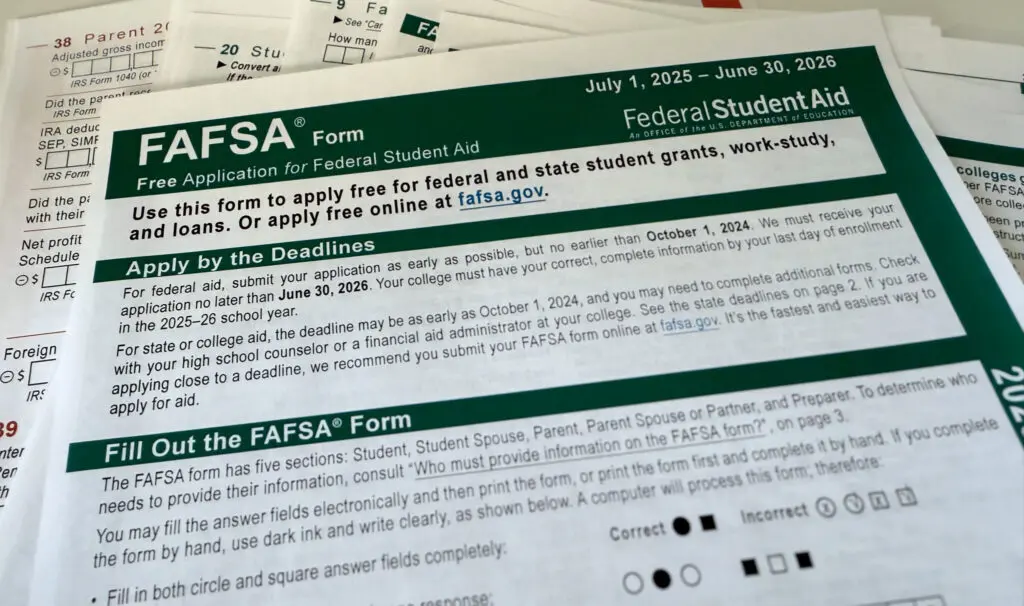You should apply for financial aid before getting accepted to college. The FAFSA opens in the fall each year. Submitting early gives your family the best chance to receive federal, state, and school-based aid.
Early action helps schools prepare accurate financial aid packages and gives students stronger financial options.
At CollegeCommit, we help families take the right steps at the right time. With over 20+ years of combined experience, our advisors guide students through the financial aid process with precision. Knowing when and how to apply for aid helps your family plan and avoid missed deadlines.
Table of Contents
ToggleKey Takeaways
- Apply for financial aid before college acceptances arrive to secure the most funding.
- You can fill out the FAFSA in the fall and update it later if needed.
- Delaying FAFSA submission may limit access to grants and scholarships.
- International students can’t get federal aid, but may qualify for private or school-based options.
- Early FAFSA planning helps families compare offers and make smarter college decisions.
When to Apply for FAFSA or Financial Aid
When Should You Apply for Financial Aid?
You should apply for financial aid as soon as FAFSA opens. The Department of Education usually releases it on October 1. Most aid programs give money on a first-come basis, and waiting until after acceptance letters can reduce available funds.
At CollegeCommit, we tell families to file the FAFSA early to meet both state and school deadlines. Submitting early helps financial aid offices prepare accurate offers and keeps your student competitive for every program.
For families new to this process, learning how to get financial aid for college makes completing forms and tracking deadlines easier.
Can You Fill Out FAFSA Before Being Accepted?
Yes, you can. Filing early ensures your financial aid applications are reviewed ahead of time so colleges can prepare estimates once admissions decisions arrive.
By completing the FAFSA as soon as possible, students give schools more time to process their financial aid packages and confirm eligibility for grants or scholarships.

Can I Apply for Financial Aid Before Applying to College?
You can file the FAFSA before sending college applications. The federal government lets you list up to ten schools on your FAFSA form page, and each school receives your information automatically.
Filing early ensures your data is processed before priority deadlines – especially useful for students applying Early Decision, Early Action, or Restrictive Early Action.
Federal Source References for FAFSA Deadlines and Forms
For the most accurate information, visit:
These official sites list deadlines, eligibility, and updates directly from the Department of Education.
How to Apply for FAFSA Step by Step
FAFSA Submission Timeline and Steps
Follow these steps to stay organized and meet priority deadlines:
- Create your FSA ID.
- Gather your tax and family information.
- Fill out your FAFSA when it opens.
- List all schools your student plans to apply to.
- Submit before any deadlines.
These steps keep your family ahead of the process and prevent delays in your financial aid applications.

FAFSA Timing: Before or After Admission?
You don’t have to wait for an admission decision to submit. Filing early lets schools prepare aid offers alongside acceptance letters.
You’ll need tax records, household data, and your FSA ID. Early submission helps avoid errors and ensures your FAFSA information is verified before decisions arrive.
Listing Colleges and Updating FAFSA Information
List every college you’re considering, even before applying. Schools use this data to create early aid estimates. If your list changes or an error appears later, log in with your FSA ID and update your FAFSA submission summary.
This keeps your information accurate and ensures each financial aid office receives your latest data.
Applying for Aid After Acceptance
Can You Apply for Financial Aid After Acceptance?
Yes, but waiting may limit your options. Many schools and states distribute funds early, so late applications can lead to smaller awards or slower processing.
At CollegeCommit, we recommend early FAFSA filing for all families. Submitting soon after it opens gives you access to more aid programs, including grants and need-based scholarships.
The Financial Impact of Delayed FAFSA Submission
Delaying FAFSA filing can reduce access to grants and scholarships. Colleges and states often run out of funds quickly, leaving loans as the main option.
To see what expenses federal aid can help with, explore how much FAFSA can cover. Early submission increases your chance of receiving the most support and ensures faster verification.
Can International Students Apply for Financial Aid After Acceptance?
International students can’t get federal aid through FAFSA, but many schools offer internal or private scholarships. We help students explore these options and organize financial documents.
A well-planned financial strategy helps international applicants manage both admissions and aid requirements smoothly.
Avoiding Common FAFSA Mistakes
What Is the #1 Most Common FAFSA Mistake?
The biggest mistake is waiting too long to submit. Many families think they must wait for college decisions, which can cost them funds.
Other common mistakes include:
- Entering incorrect income data
- Forgetting to create or link the FSA ID
- Listing too few schools on the FAFSA form page
Reviewing your information carefully avoids errors and protects eligibility for better financial aid packages.
FAFSA Fact Box
Over $3 billion in financial aid goes unclaimed each year because students don’t complete the FAFSA on time. Many believe they won’t qualify but still could.
Submitting early keeps your student eligible for both need-based and merit-based aid programs.
Strategic Financial Aid Planning for Families
FAFSA and Loan Timing With Admissions
Filing early helps schools prepare accurate aid offers that align with acceptance letters. When results come in, families can compare both admissions and financial options at once.
If your student plans to use loans, submitting early ensures eligibility before deposit deadlines. We don’t just advise – we engineer your child’s admissions edge through planning and timing.

Streamlined Comparison and Best Practices
Students applying to the Ivy League and Top 20 schools face strict aid deadlines. Our advisors – former admissions officers and Ivy League graduates – guide families through each step.
We recommend:
- Submit the FAFSA as soon as it opens.
- Checking each school’s requirements.
- Keeping copies of all documents.
When comparing offers, learn how much a scholarship can cover, since merit-based awards often work alongside need-based aid.
CollegeCommit offers elite college admissions consulting, essay coaching, and test prep. We guide students through each stage – from planning to acceptance – with care and precision.
Book Your Private Consultation
At CollegeCommit, we offer insight, direction, and real results. We work with families across the country and globally, 100% online. We guide students from 8th through 12th grade with yearly counseling packages that fit each goal.
Ready to turn uncertainty into opportunity? Join our next cohort at CollegeCommit: Where Preparation Becomes Placement.
Frequently Asked Questions About FAFSA
Do I need to wait for acceptance letters to apply for aid?
No. Apply as soon as the FAFSA opens.
.
Can I update my FAFSA after submission?
Yes. Log in with your FSA ID to make changes.
What if I miss a priority deadline?
You can still apply, but you may receive less aid. Many families also ask how many years you can get financial aid. Understanding this helps long-term academic planning.


